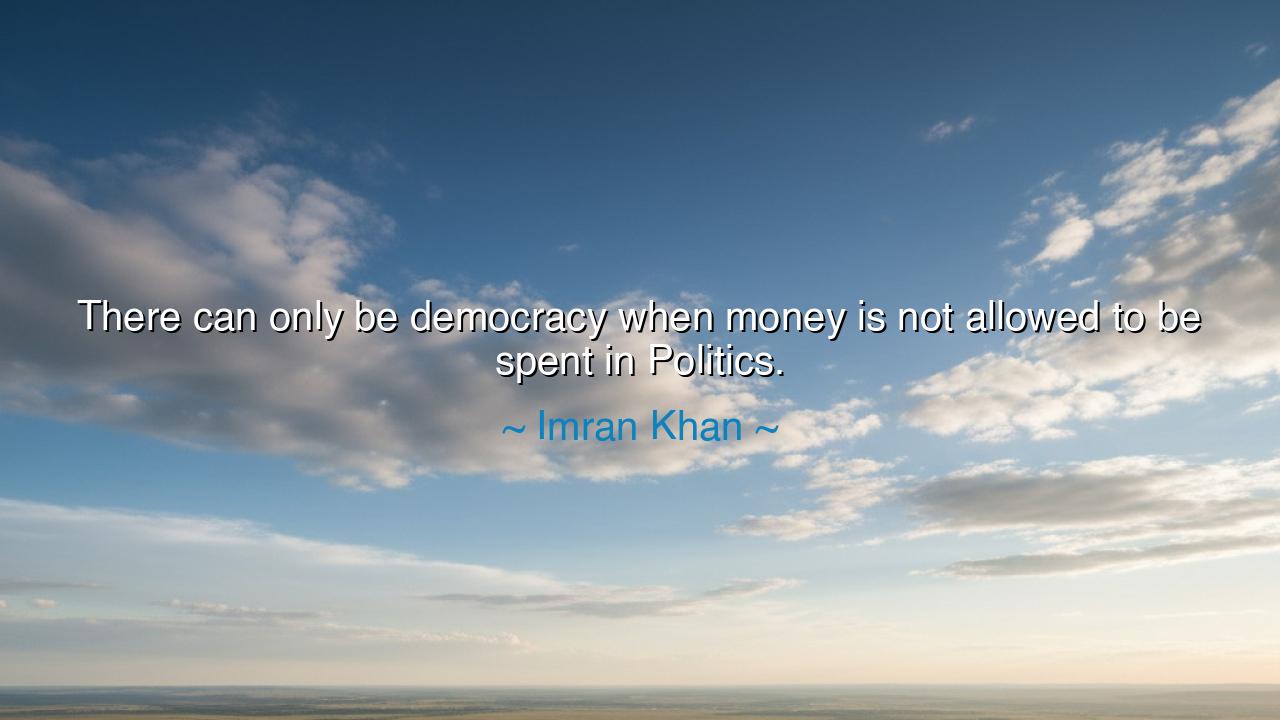
There can only be democracy when money is not allowed to be






Hear the words of Imran Khan, who spoke as both cricketer-hero and statesman: “There can only be democracy when money is not allowed to be spent in Politics.” This is no idle thought, but a cry against corruption and the hidden chains that bind the people. For when money buys voices, elections cease to be the will of the people, and become instead the marketplace of power, where the highest bidder rules.
The essence of democracy is equality: each citizen, rich or poor, holds the same voice, the same right to shape the destiny of the nation. Yet when wealth floods campaigns, when fortunes buy influence, this equality is betrayed. The ballot is no longer sacred, but stained by gold. Thus Khan declares that democracy cannot coexist with unchecked money in politics—for then it is no longer the people’s government, but the government of those who can pay.
History bears witness to this truth. In the days of the Roman Republic, senators often bought loyalty with coin, bribing voters and hiring mobs to secure office. The system rotted from within, until the republic fell to tyranny. Likewise, in modern times, vast corporate donations and hidden financing tilt the scales, drowning out the voices of the poor and silencing the powerless. Each age shows the same pattern: when wealth rules politics, justice withers.
Khan himself rose in Pakistan as a critic of this decay. He promised to break the grip of dynasties and wealthy elites who treated politics as inheritance and investment. His words echo the frustration of countless citizens across the world, who watch their leaders serve donors rather than the people. His vision is that only by removing money from the heart of politics can true democracy breathe.
Therefore, let this wisdom endure: democracy is not secured by votes alone, but by the fairness of the field on which those votes are cast. When money dominates, democracy is an illusion; when money is restrained, democracy is reborn. Imran Khan’s words remind us that freedom must be guarded not only from tyrants with swords, but also from oligarchs with gold. For the truest power must belong not to wealth, but to the people.






GDGold D.dragon
Imran Khan’s view on the relationship between money and democracy is compelling, especially in light of growing concerns about political corruption. Can we truly claim to have a functioning democracy if money dictates who runs for office and who gets heard? What reforms could be put in place to address this issue without stifling innovation or political participation?
THTran Thanh Hue
Imran Khan’s statement raises a complex issue about the role of money in democratic processes. Does the current system inherently favor the wealthy, making it difficult for ordinary citizens to have a voice? If we remove money from politics, would it be possible to ensure that all voices are equally heard, or would we simply shift the focus to other sources of influence and power?
TTQuynh Trang Tran Thi
The idea that democracy can only exist without money in politics is appealing, but I wonder if it’s realistic. Could we eliminate money’s influence entirely, or would doing so limit free speech and the ability to organize? How do we strike the right balance between fair political representation and the necessary financial resources to run effective campaigns and spread important messages?
NHNgoc Hong
Imran Khan’s perspective seems to imply that democracy is compromised by financial power. But how do we address the reality that elections and political campaigns require funding? If money were banned from politics, would grassroots movements be able to thrive, or would the wealthy find alternative ways to influence decisions? Is it possible to create a truly level playing field without completely overhauling the system?
TNthanh nhan
This quote brings up an important issue about the intersection of wealth and political power. Could it be that the very system of democracy is flawed if money has such an outsized influence in shaping political outcomes? What are the practical steps to reduce the influence of money in politics? Would limiting campaign donations and corporate lobbying be enough to ensure a fairer political system?